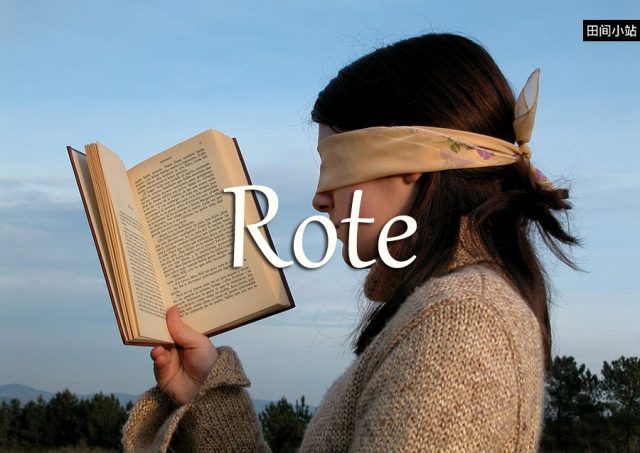本文经授权转载自微信公众号:田间小站

TOEFL SAT
外刊例句
- Singapore’s schools have long held a reputation for didactic teaching, rote learning and academic brilliance.
新加坡的学校长期以来以说教式教学、死记硬背和优异的学业成绩著称。
——《经济学人》 - There is also the desire to escape local school systems, which focus more on exams and rote learning.
同时,家长们还希望子女能摆脱当地学校体制的束缚,因为当地教育更强调的是考试和机械式的学习。
——《纽约时报》
基本释义
[noun] mechanical or habitual repetition of something to be learned
[名词] 机械地或习惯性地重复要学的东西
深入解读
今天小站来和大家聊的这个 rote 是一个看着陌生,含义却十分熟悉的单词。该词最早于14世纪出现在英语中,词源不详,有说法认为可能源自古法语 rote (路线、路途,含义同英语单词 route )或源自拉丁语 rota (车轮、轮子,也是英语单词 rotary 的词源)。
该词原本用作名词指“习惯、习性”,后来发展为“老一套、机械的做法、生搬硬套”,而现在更多的是用在学习上表示“死记硬背”,常用习语 learn sth by rote 作贬义表示“死记硬背地学”,比如:
- 那个口音很特别的女孩靠死记硬背记住了这些公式。
The girl who has a peculiar accent learned the equations by rote.
也可以用作形容词表示“死记硬背的”或“老一套的、例行的、常规的”,比如:
- 死记硬背的学习
rote learning - 这家久负盛名的公司要求得到的只是例行的同意。
The venerable company sought nothing more than rote agreement.
与 rote learning 相应的是上面《经济学人》例句中提到的 didactic teaching (说教式教学),相对的则有意义学习(meaningful learning)、联想学习(associative learning)、主动学习(active learning)等。
名著用例
And as he looked at the unpractised mouth and lips, he thought that such a daughter of the soil could only have caught up the sentiment by rote.
在他看着她那张纯真自然的嘴和嘴唇的时候,心想,这样一个乡下女孩子会有这种情绪,只不过是照着别人的话说罢了。
出自英国小说家托马斯·哈代的长篇小说《德伯家的苔丝》(Tess of the d'Urbervilles)。
同近义词
- memorization: the process of committing something to memory or learning something by heart
- repetition: the action of repeating something that has already been said or written
- recitation: the action of repeating something aloud from memory
